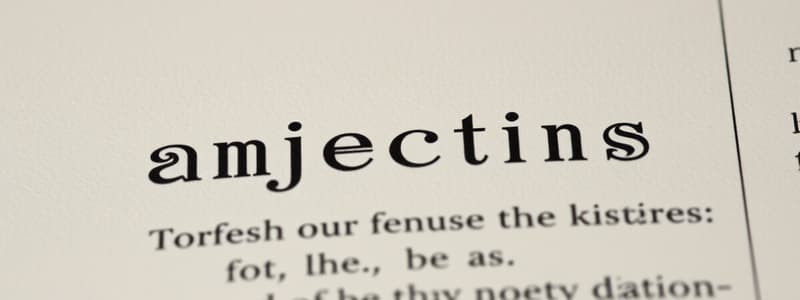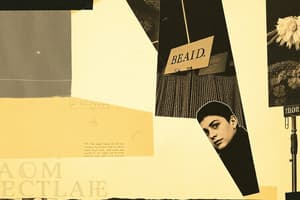Podcast
Questions and Answers
Which of the following examples correctly follows the order of adjectives in a string?
Which of the following examples correctly follows the order of adjectives in a string?
- A big old Italian restaurant
- A small red antique box (correct)
- An old large wooden chair
- A beautiful leather black purse
Which prefix correctly transforms the adjective 'certain' into its opposite meaning?
Which prefix correctly transforms the adjective 'certain' into its opposite meaning?
- dis
- non
- un (correct)
- in
What is the function of the phrase 'the + adjective' in a sentence?
What is the function of the phrase 'the + adjective' in a sentence?
- To describe an action
- To form a comparative adjective
- To categorize a group of people (correct)
- To specify a particular noun
Which of the following represents a correct formation of an adjective with opposite meanings?
Which of the following represents a correct formation of an adjective with opposite meanings?
Which of these sentences uses an adjective to modify a noun appropriately?
Which of these sentences uses an adjective to modify a noun appropriately?
Study Notes
Definition and Function of Adjectives
- Adjectives describe or modify nouns.
- Example: "fairy tale" is an imaginary story with unrealistic characters in a fantastic setting.
Purpose of Adjectives
- Help to escape the real world and refresh the mind.
Placement of Adjectives
- Typically appear directly before the noun they modify.
- Examples:
- A pretty girl
- Red flowers
- A long stick
- Heavy boxes
- Warm weather
- Examples:
Formation of Opposite Adjectives
- Adjectives of opposite meanings are commonly created by adding prefixes such as:
- un (clear – unclear)
- in (important – unimportant)
- dis (able – disable, assemble – disassemble)
- Additional examples:
- predictable – unpredictable
- believable – unbelievable
- common – uncommon
- aware – unaware
- ambiguous – unambiguous
- conventional – unconventional
- certain – uncertain
- definite – indefinite
- correct – incorrect
- comparable – incomparable
- complete – incomplete
- evitable – inevitable
- expensive – inexpensive
- content – discontent
- similar – dissimilar
Order of Adjectives
- When using multiple adjectives, they should follow a specific order:
- Size/Shape, Age, Color, Origin, Material
- Examples:
- A big brown house
- A small old English desk
- A beautiful black Italian leather purse
- Delicious Chinese food
Use of "The + Adjective"
- "The + adjective" can denote a class or group of people, functioning as a noun.
- Examples:
- the old
- the young
- the poor
- the rich
- the oppressed
- the homeless
- Examples:
- Example in context: "This popular TV show is loved by the old."
Studying That Suits You
Use AI to generate personalized quizzes and flashcards to suit your learning preferences.
Description
Explore the role and purpose of adjectives in language. This quiz covers their definition, common placements, and how to form opposites. Test your understanding of descriptive language and the nuances of adjective usage.




